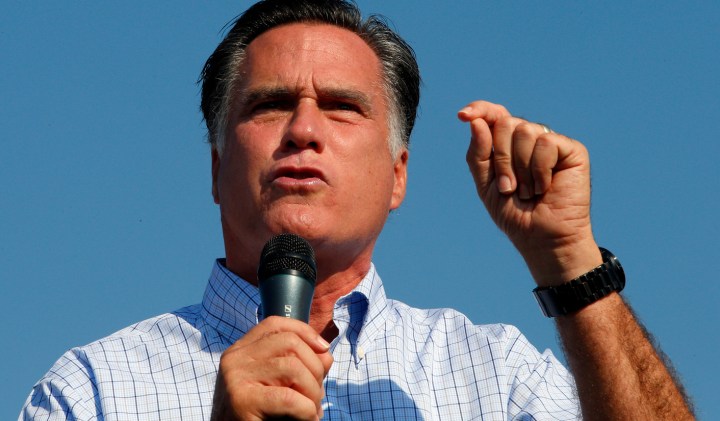World
Mitt Romney’s likeability chasm

Republican presidential candidate Mitt Romney has 70 days to translate his positives—particularly managerial competence—into the kind of thing American voters value: ‘likeability’. It’s a tough challenge for a man who appears not to know exactly what he likes. By J BROOKS SPECTOR.
Hurricane Isaac has apparently missed Tampa, Florida, but it now has the American Gulf Coast in its crosshairs. In fact, it may even generate a kind of reprise of Hurricane Katrina’s impact on that very same region exactly seven years ago.
The difference, of course, is that this new storm has already had a major impact on the quadrennial Republican presidential nominating convention now gathering in Tampa. It forced the virtual cancellation of the convention’s opening day and now seems likely to divert attention from Republicans’ efforts to generate a wave of enthusiasm for their now-certain candidate, Mitt Romney.
This is a problem for the party because, politely put, Romney suffers from what is termed a likeability gap, especially when measured against his opponent, Barack Obama. In fact, this “gap” thing has a tradition in American history of making political life impossible for someone.
First there was the “missile gap”, the supposed edge held by the Soviets over America back in the late 1950s in terms of actual, real live, working nuclear weapon delivery systems capable of “bombing America back into the stone age”, as the turn of phrase went. This powerful image, and the threat that was part of it, had a hand in helping elect John F Kennedy to the presidency in 1960 over Richard Nixon with his promise to get America moving again (and end that threatening missile gap). The only problem, of course, was that the gap was theoretical and a misreading of classified studies, not actual facts on the ground. Yes, the Soviets had some truly awesome thermonuclear devices, but they had no real way to send such bombs to their intended targets effectively. Never mind.
And then there was the “credibility gap”. This one had a bit more meat on its bones. It arose out of the yawning difference between the repeated assertive public claims from officials and generals about the success of the American military effort in Vietnam—in comparison with what every American could see on television every night, could hear from its soldiers when they wrote home and could measure as one optimistic promise after another proved hollow. Readers may just possibly recall that the nascent presidential campaign of Mitt’s father, George Romney, collapsed after he returned from Vietnam to say he had been “brain washed” by the generals—or, in other words, had fallen foul of the credibility gap himself.
Now we have the “likeability gap”, and it is Romney’s latest obstacle after beating back a swarm of indifferent challengers for the nomination. And this one may be his ultimate challenge in gaining the presidency.
Put this way, the likeability gap is the net difference in the positive personal qualities many voters ascribe to Obama and Romney, respectively, in one poll after another. This likeability gap is a major component of a larger challenge for the Romney forces as they ready themselves for his acceptance speech, scheduled to take place on Thursday.
There is a need to reclaim the Romney narrative, to keep the Obama campaign from continuing to define him as a rich man who has dodged, bobbed and weaved his way around the US tax system; demonstrated his heartlessness in squeezing profits out of corporate leveraged buyouts that eliminated middle- and working-class jobs; and who believes despoiling the US government’s social safety net is the right way to offset undeserved tax cuts for the rich.
There is much polling data showing voters believe Romney would actually be the better manager of the nation’s economic affairs, the very issue many voters believe is the most important one in the election. Yet the polls also seem to say that voters simply don’t like him all that much. Interestingly, despite these responses, most polls taken among likely voters also indicate the race remains neck and neck nationally, although state by state results still give the president a modest edge in the all-important Electoral College projections.
The most recent Economist/YouGov poll, for example, noted that even though both men were politicians (and we know what that means); 40% of voters said Obama believes what he says, while only 27% have the same judgment of Romney. When asked, “regardless of whether you agree with him, do you like Barack Obama as a person”, 57% said they like him a lot or like him somewhat. In contrast, in response to the same question, Mitt Romney came in at much more modest 39%. And when asked to decide which words best define a candidate, 52% said Obama was compassionate versus 38% for his opponent and 56% thought Obama was inspiring, versus 34% for the Republican. These are high hills for Romney to climb when one realizes that historically Americans have tended to hope they will elect a leader who leads and inspires, rather than just weighs the options and ticks the right boxes.
To offset this view among many voters, the GOP plan was to have his wife, Ann, help soften Mitt’s image and make him more sympathetic, leaving other orators such as keynote speaker New Jersey Governor Chris Christie to make the hard-edged, red meat efforts. Then the candidate would be set up to score a home run, tying all the threads together with a strong effort on Thursday night in his acceptance speech. Ann Romney, in particular, has been tasked with the job of painting her husband as a super-competent solid citizen, a compassionate, religiously grounded family man, socially responsible businessman and corporate global citizen. In short, her moment was designed to move the needle on the meter and make him someone voters could embrace with their hearts—or at least stop holding at arm’s length.
This, in turn, would help refute a popular view in many circles, memorably defined the other day by veteran Republican politician Haley Barbour, that most voters probably know very little about Romney except what Obama has told them: “He’s a wealthy plutocrat married to a known equestrian.” (This, of course, is a reference to his wife’s hobby of raising highly trained horses that compete in competitive dressage events.)
One problem with this scenario is that the candidate himself still appears to be uncomfortable with the advice he’s been getting for such an image rebuild. As AP the reported, “Romney’s inability so far to counter President Barack Obama’s efforts to portray him as an out-of-touch elitist who got rich through predatory business practices is perhaps his biggest general election hurdle, many top Republicans here said Monday. Replacing this image with something more appealing—and, they say, more fairly reflective of Romney’s real life and values—is by far the most urgent task this week for the GOP nominee. Again and again, top operatives referred to the convention as an opportunity for Romney to ‘reintroduce’ himself to the electorate.”
A further problem for the GOP, now, is that Ann Romney’s speech will be vying for attention on television screens and twitter messages Tuesday night across America with the meteorological news from New Orleans, replete with memories of Katrina’s devastation during George W Bush’s administration. (Taking advantage of this potential sore point politically, as well as doing absolutely the right thing in policy terms, Obama has already declared the Gulf Coast a federal disaster area. This proactively makes substantial national government assistance available to the threatened area’s state and local governments and to residents even before the hurricane comes ashore, drawing a real contrast with the way Katrina was handled.)
Still another challenge is that much of the convention’s first real day may not even make it to full, live coverage on TV. The networks have already announced they will limit coverage to an hour or so each night until the final night. As a result, Ann Romney’s speech may well only reach most people via a couple of sound bites, or perhaps primarily through the reflections of ideologically-based, duelling commentators in the days ahead on Fox News and MSNBC.
The Economist magazine (of all periodicals), in musing about what really motivates Romney, felt compelled to say, “When Mitt Romney was governor of liberal Massachusetts, he supported abortion, gun control, tackling climate change and a requirement that everyone should buy health insurance, backed up with generous subsidies for those who could not afford it. Now, as he prepares to fly to Tampa to accept the Republican Party’s nomination for president on 30 August, he opposes all those things. A year ago he favoured keeping income taxes at their current levels; now he wants to slash them for everybody, with the rate falling from 35% to 28% for the richest Americans. All politicians flip-flop from time to time; but Mr Romney could win an Olympic medal in it…. he has appeared as a fawning PR man, apparently willing to do or say just about anything to get elected.” After listing his various bobbings and weavings on foreign, tax and economic policy, the Economist felt compelled to conclude, “Behind all this sits the worrying idea of a man who does not really know his own mind.”
It is faint praise like this from a pro-business, limited government-supporting journal that continues to feed the kind of mockery that emanated this week from the pen of columnist David Brooks, The New York Times’ thoughtful house conservative. Brooks felt it necessary to write a wicked caricature of Mitt Romney that began: “Mitt Romney was born on March 12, 1947, in Ohio, Florida, Michigan, Virginia and several other swing states. He emerged, hair first, believing in America, and especially its national parks. He was given the name Mitt, after the Roman god of mutual funds….”
Brooks’ column concluded, “After his governorship, Romney suffered through a midlife crisis, during which he became a social conservative. This prepared the way for his presidential run. He barely won the 2012 Republican primaries after a gruelling nine-month campaign, running unopposed…. If elected, he promises to bring all Americans together and make them feel inferior.”
Despite the fact that the nation’s attention will be divided between Hurricane Isaac, memories of Hurricane Katrina, the final days of the summer break and sporadic glimpses of the Republican convention, it is nevertheless crunch time for Mitt Romney and those around him to reboot the nation’s rapidly congealing image of him and what he hopes to achieve.
There are now only 70 days left before the election. These will soon rush by in a dizzying round of speeches, debates and other campaign appearances. Regardless of everyone’s best efforts, miscues will come from an increasingly exhausted candidate and his campaign team. As a result, this is the moment when Romney must start to close the sale—or join the ranks of those other candidates who sought but couldn’t grasp the final prize. DM
Read more:
Mitt Romney RNC: GOP still frets about candidate’s image, Politico
WATCHING THE SHOW: Mitt Romney, trying to connect, AP
Ann Romney, Christie on deck at GOP convention, AP
Business and Political Experiences Pull Romney 2 Ways on Economy, The New York Times
The Real Romney, The New York Times
So, Mitt, what do you really believe? Too much about the Republican candidate for the presidency is far too mysterious, the Economist
With Five Romney Sons, Five More Spokesmen, The New York Times
Republicans ready to roll, but Isaac clouds tone, AP
Photo: Republican presidential candidate and former Massachusetts Governor Mitt Romney speaks at a campaign rally in Powell, Ohio August 25, 2012. REUTERS/Brian Snyder


















 Become an Insider
Become an Insider